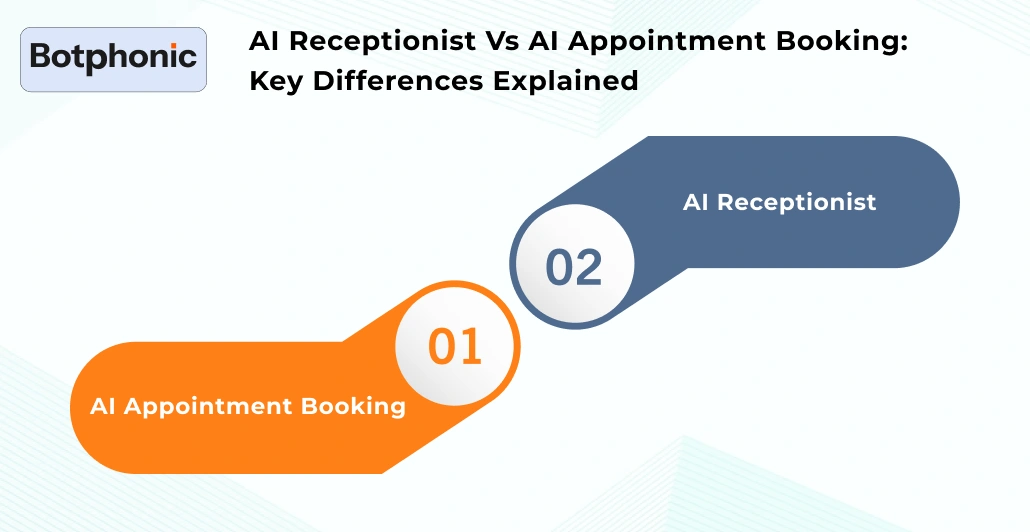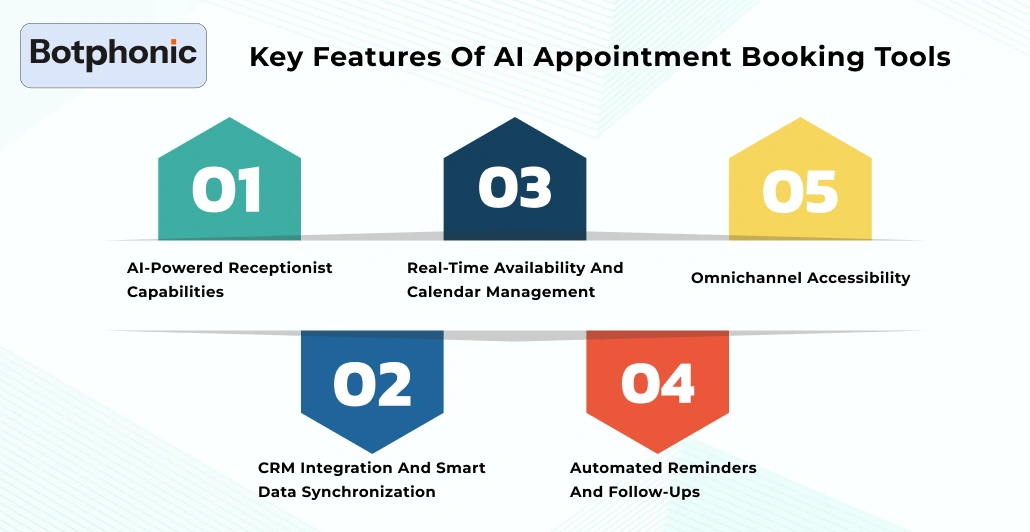
Summarize Content With:
Quick Summary
In this guide, we will be discovering what an AI appointment booking is, how it works, and some of its key features that help make it superior to traditional appointment booking methods.
Along with its core features, we will be learning how to get started with adopting it in workflow management.
Introduction
Appointment bookings, sending reminders, touching upon updates, and requiring immediate follow-ups can truly be agonizing for a single human. But the era is developing so fast, and it is no longer just about appointment scheduling-there is an expectation for instant response and a greater optimization on the operational side from the corporate end. But do you wish to know exactly what an AI scheduling system is and why companies are rushing toward it in their business?
For any modern business, an AI appointment booking bot is more than just a nice tool; this scheduler can also predict, working hand-in-hand with CRM booking systems, online calendaring, and customer data platforms. This is to say, whether you are the patient on one end or your client or customer on the other, you can pay for an appointment on various channels at your convenience. Utilizing voice-enabled AI and cutting-edge voice and data analysis allows these solutions not just to automate scheduling but also to deliver insights related to lead generation, customer retention, and process optimization.
AI Receptionist vs AI Appointment Booking: Key Differences Explained

1. AI Appointment Booking
An AI appointment booking system focuses solely on scheduling and managing appointments. It’s designed so it can handle bookings automatically, reschedule them, share reminders, and even help with cancellations without involving human staff. Most well-known platforms usually integrated directly with calendars such as Google or Outlook, and even with booking platforms or CRMs. It is particularly useful for industries such as healthcare providers, fitness studios, home services, education, and hospitality, where appointment management is a critical aspect.
2. AI Receptionist
An AI receptionist works as a virtual front desk assistant. It can greet customers, manage calls, answer common questions related to industries and their concerns, and even help by transferring calls to a responsible agent. One of the core features is its consistent availability, and it can easily manage both voice and chat interactions. Across different mediums such as phone, SMS, WhatsApp, or web chat. It’s widely used in industries such as healthcare, real estate, salons, and law firms, where communication is one of the main aspects. Its key strength is that it can offer human-like interaction while integrating seamlessly with phone systems, CRM, and help desk tools.
Try the Botphonic AI appointment booking system and elevate your customer support
Try Now!!Key Features of AI Appointment Booking Tools

The true ability of AI appointment booking tools doesn’t just lie in simple automation, but also in how they intelligently orchestrate scheduling workflows that also adapt to customer behaviour and business needs. Modern AI solutions are effectively acting as a virtual receptionist or an AI call assistant that optimizes NLP, real-time data analytics, and CRM integration to deliver a seamless experience.
Let’s check out some core features of AI appointment booking tools, which set them apart from traditional methods.
1. AI-Powered Receptionist Capabilities
These tools imitate the functionality of a human front desk operator. An AI call assistant can handle inbound calls and interpret customer intent by using AI voice recognition to respond conversationally.
2. CRM Integration and Smart Data Synchronization
An advanced CRM booking system no longer just logs appointments but it integrates customers’ histories and preferences by leading data directly into the scheduling process. For instance, the sales team uses appointment bots that immediately link bookings to their CRM scheduling software and streamlining lead qualification.
3. Real-Time Availability and Calendar Management
It’s considered as one of the most valuable features. Real-time synchronization with popular calendar tools such as Google Calendar, Outlook, or Zoho schedule allows for mitigating double booking errors and ensures availability is updated.
4. Automated Reminders and Follow-Ups
AI tools automate confirmation messages, reminders, and follow-ups via SMS, email, or chatbot notifications. With this feature, it automatically helps make a drastic change while reducing no-shows, while also offering frictionless rescheduling.
5. Omnichannel Accessibility
Customers these days no longer care what sector it is, and are always expecting flexibility. The best appointment booking AI tools allow clients to book an appointment through multiple channels. For instance, websites, mobile apps, messaging platforms, and even voice assistants.
This adoption of AI is not just for efficiency but also for personalization. Just think of a healthcare scheduler that doesn’t just search for the next available slots but it also suggests the doctor who has looked out the patient before.
Traditional Scheduling Tools vs. AI Appointment Booking Tools
| Feature / Capability | Traditional Scheduling Tools | AI Appointment Booking Tools |
| Booking Method | Manual entry, static online forms | Conversational AI receptionist, AI call assistant, or appointment bot |
| Availability Updates | Often delayed, risk of double bookings | Real-time calendar synchronization with Google, Outlook, and Zoho Schedule |
| Customer Experience | Limited to office hours and manual staff support | 24/7 availability, customers can easily arrange, reschedule, or cancel |
| CRM Integration | Basic or separate system | Seamless CRM booking system integration with lead tracking & customer history |
| Scheduling Intelligence | Fixed time slots, no optimization | Predictive scheduler powered by machine learning & data analysis |
| Reminders & Follow-Ups | Manual or generic email reminders | Automated, personalized SMS/email/chatbot reminders to reduce no-shows |
| Channel Flexibility | Mostly website-based booking pages | Omnichannel scheduling via phone, chat, apps, and AI voice assistants |
| Business Insights | Limited reporting, mostly static data | Advanced analytics dashboards, trend forecasting, and lead generation insights |
| Scalability | Struggles with high booking volumes | Easily scales across multiple teams, locations, or global time zones |
Conclusion
An AI appointment booking is redefining how businesses manage their schedules. It has evolved the system that used to be done manually. But these days, these time-consuming tasks are getting done through smart and automated systems with data-driven processes.
As per the survey, it was seen that about 61% skipped their appointment as they were facing challenges while scheduling. Leveraging AI call assistants, AI receptionists, predictive schedulers, and CRM integration, businesses are enhancing customer experience, improving operational efficiency, and generating insights that help in growth.

